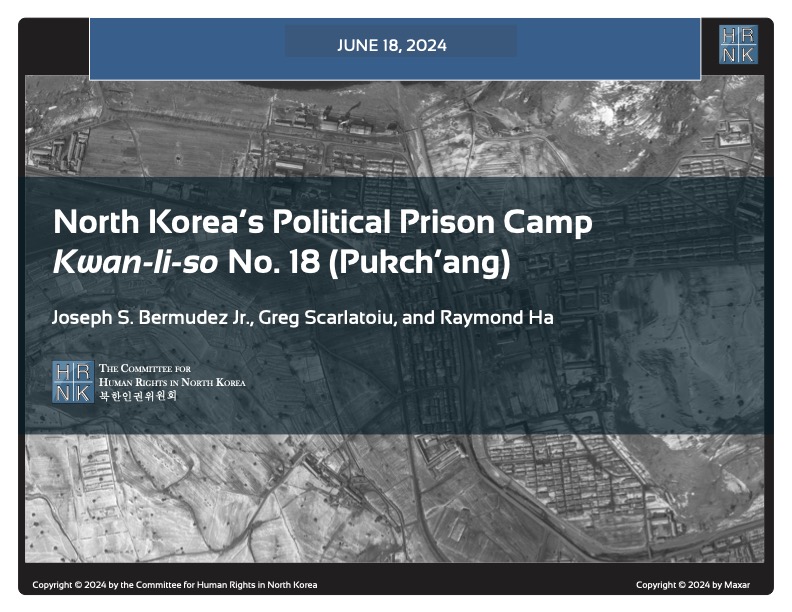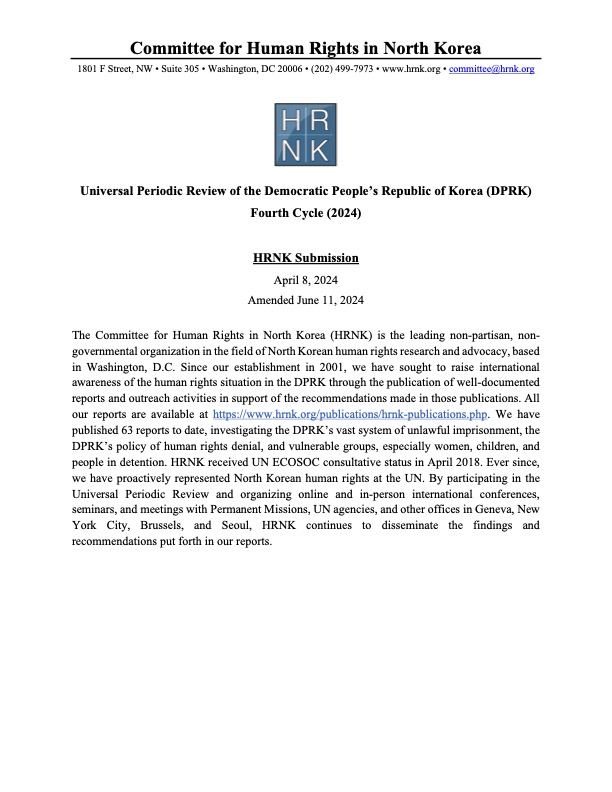August 12, 2020
His Excellency Moon Jae-in
President of the Republic of Korea
The Blue House
Seoul, Republic of Korea
RE: Oppression of the North Korea Human Rights Movement by your administration
We the undersigned are writing you today as individuals who greatly value the friendship and the strong alliance between the people of South Korea and the United States of America, but we are deeply troubled by the actions of your administration aimed at undermining the North Korea human rights movement by targeting all the major organizations that work to help rescue, educate, protect and/or improve the lives of North Koreans. We represent individuals who have worked in the administrations of both Democratic and Republican Presidencies including former Presidents Richard Nixon, Gerald Ford, Jimmy Carter, Ronald Reagan, George H.W. Bush, Bill Clinton, George W. Bush, Barack Obama, and Donald Trump, and represent nongovernmental organizations that span the political spectrum in the USA, but we are all united with this concern: it is the responsibility of the international community, especially the Republic of Korea, to uphold the human rights of the people of North Korea. As stated by the UN Commission of Inquiry on Human Rights in the People’s Republic of Korea (February 2014): “The international community must accept its responsibility to protect the people of the Democratic People’s Republic of Korea from crimes against humanity, because the Government of the Democratic People’s Republic of Korea has manifestly failed to do so.”
In particular the UN COI recommended that China and all states: “Respect the principle of non-refoulement and, accordingly, abstain from forcibly repatriating any persons to the Democratic People’s Republic of Korea” and “that States, foundations and engaged business enterprises provide more support for the work of civil society organizations to improve the situation of human rights in the Democratic People’s Republic of Korea, including efforts to document human rights violations and to broadcast accessible information into each country.
Unlike prior administrations in South Korea, your administration took the unusual step to forcibly repatriate two North Koreans to conditions of danger and has not only ended all support but discouraged support for the civil society organizations that work to improve human rights in the DPRK and advocate for defectors in South Korea. The announcement in July by the Ministry of Unification that it would conduct office inspections of 25 North Korean human rights and resettlement civil society organizations and demand an additional 64 accredited non-governmental organizations submit documentation is a chilling form of intimidation as they were all clearly targeted simply for their North Korea human rights work.
We respectfully request, as Americans who have a great respect for the people of Korea, that you reconsider your policies and do not again forcibly repatriate North Koreans to conditions of danger and that you review your policy of intimidating and harassing North Korean human rights organizations and instead help support their efforts to promote human rights for North Koreans.
Respectfully,
Richard V. Allen, National Security Advisor for President Ronald Reagan and Deputy National Security Advisor for President Richard Nixon (helped rescue future ROK president Kim Dae Jung)
Roberta Cohen, Deputy Assistant Secretary of State for Human Rights in the Department of State’s first human rights bureau for President Jimmy Carter
Ambassador Robert G. Joseph, Under Secretary of State for Arms Control and International Security for George W. Bush
Ambassador Robert R. King, Special Envoy for North Korea Human Rights for President Barack Obama
Ambassador Winston Lord, Director of Policy Planning Staff at the State Department for President Gerald Ford and Special Assistant to the National Security Advisor for President Richard Nixon and Ambassador to China for President Ronald Reagan and President George H.W.Bush and Assistant Secretary of State for President William Clinton
Barton W. Marcois, Principal Deputy Assistant Secretary of Energy for Policy and International Affairs for George W. Bush Administration
Honorable Tidal W. McCoy, Acting Secretary and Senior Assistant Secretary of the Air Force for President Ronald Reagan
Thomas C. Montgomery, Senior Vice President of Congressional Affairs at the Export-Import Bank of the United States for President George W. Bush
Andrew Natsios, Administrator, US Agency for International Development for President George W. Bush
Daniel Pipes, Policy Planning Staff for President Ronald Reagan
Gare Smith, Principal Deputy Assistant Secretary of State for the Bureau of Democracy Human Rights and Labor for President William Clinton
Katrina Lantos Swett, Chair of the U.S. Commission on International Religious Freedom during President Barack Obama’s Administration
Christian Whiton, Senior Advisor for Strategic Communications for State Department for President Donald Trump and Deputy Special Envoy for North Korea Human Rights for President George W. Bush
Nongovernmental organizations and private citizens joining in solidarity with the above signatories from the USA and Around the World:
Suzanne Scholte, President, Defense Forum Foundation
Tara O, President, East Asia Research Center
Dr. Jianli Yang, Founder and President, Citizen Power Initiatives for China
Nicholas Eberstadt, Henry Wendt Chair at the American Enterprise Institute (title for identification purpose only)
Greg Scarlatoiu, Executive Director, Committee for Human Rights in North Korea (HRNK)
Benedict Rogers, East Asia Team Leader, CSW-UK
Ann Buwalda, Executive Director, Jubilee Campaign USA Inc
Deanna List of Virginia, North Korean Freedom Coalition (NKFC) Member
Wendy Wright, President, Christian Freedom International
Patrick Cheh of California, President, Waking Up Media, Producer of Crossing
Atabongwoung Gallous of South Africa. Chairperson, NPO: Tibet Rescue Initiative in Africa; NKFC member
This is the first satellite imagery report by HRNK on a long-term political prison commonly identified by researchers and former detainees as Kwan-li-so No. 18 (Pukch'ang). This report was concurrently published on Tearline at https://www.tearline.mil/public_page/prison-camp-18.
To understand the challenges faced by the personnel who are involved in North Korea’s nuclear program, it is crucial to understand the recruitment, education, and training processes through the lens of human rights. This report offers a starting point toward that understanding. North Korea’s scientists and engineers are forced to work on the nuclear weapons program regardless of their own interests, preferences, or aspirations. These individuals may be described as “moder
In this submission, HRNK focuses its attention on the following issues in the DPRK: The status of the system of detention facilities, where a multitude of human rights violations are ongoing. The post-COVID human security and human rights status of North Korean women, with particular attention to sexual and gender-based violence (SGBV). The issue of Japanese abductees and South Korean prisoners of war (POWs), abductees, and unjust detainees.
This report provides an abbreviated update to our previous reports on a long-term political prison commonly identified by former prisoners and researchers as Kwan-li-so No. 25 by providing details of activity observed during 2021–2023. This report was originally published on Tearline at https://www.tearline.mil/public_page/prison-camp-25.
This report explains how the Kim regime organizes and implements its policy of human rights denial using the Propaganda and Agitation Department (PAD) to preserve and strengthen its monolithic system of control. The report also provides detailed background on the history of the PAD, as well as a human terrain map that details present and past PAD leadership.

HRNK's latest satellite imagery report analyzes a 5.2 km-long switchback road, visible in commercial satellite imagery, that runs from Testing Tunnel No. 1 at North Korea's Punggye-ri nuclear test facility to the perimeter of Kwan-li-so (political prison camp) no. 16.
This report proposes a long-term, multilateral legal strategy, using existing United Nations resolutions and conventions, and U.S. statutes that are either codified or proposed in appended model legislation, to find, freeze, forfeit, and deposit the proceeds of the North Korean government's kleptocracy into international escrow. These funds would be available for limited, case-by-case disbursements to provide food and medical care for poor North Koreans, and--contingent upon Pyongyang's progress
For thirty years, U.S. North Korea policy have sacrificed human rights for the sake of addressing nuclear weapons. Both the North Korean nuclear and missile programs have thrived. Sidelining human rights to appease the North Korean regime is not the answer, but a fundamental flaw in U.S. policy. (Published by the National Institute for Public Policy)

North Korea’s forced labor enterprise and its state sponsorship of human trafficking certainly continued until the onset of the COVID pandemic. HRNK has endeavored to determine if North Korean entities responsible for exporting workers to China and Russia continued their activities under COVID as well.
George Hutchinson's The Suryong, the Soldier, and Information in the KPA is the second of three building blocks of a multi-year HRNK project to examine North Korea's information environment. Hutchinson's thoroughly researched and sourced report addresses the circulation of information within the Korean People's Army (KPA). Understanding how KPA soldiers receive their information is needed to prepare information campaigns while taking into account all possible contingenc
This report is part of a comprehensive long-term project undertaken by HRNK to use satellite imagery and former prisoner interviews to shed light on human suffering in North Korea by monitoring activity at political prison facilities throughout the nation. This is the second HRNK satellite imagery report detailing activity observed during 2015 to 2021 at a prison facility commonly identified by former prisoners and researchers as “Kwan-li-so No. 14 Kaech’ŏn” (39.646810, 126.117058) and
This report is part of a comprehensive long-term project undertaken by HRNK to use satellite imagery and former prisoner interviews to shed light on human suffering in North Korea by monitoring activity at civil and political prison facilities throughout the nation. This study details activity observed during 1968–1977 and 2002–2021 at a prison facility commonly identified by former prisoners and researchers as "Kyo-hwa-so No. 3, T'osŏng-ni" and endeavors to e
This report is part of a comprehensive long-term project undertaken by HRNK to use satellite imagery and former detainee interviews to shed light on human suffering in the Democratic People’s Republic of Korea (DPRK, more commonly known as North Korea) by monitoring activity at political prison facilities throughout the nation. This report provides an abbreviated update to our previous reports on a long-term political prison commonly identified by former prisoners and researchers as Kwan-li-so
Through satellite imagery analysis and witness testimony, HRNK has identified a previously unknown potential kyo-hwa-so long-term prison-labor facility at Sŏnhwa-dong (선화동) P’ihyŏn-gun, P’yŏngan-bukto, North Korea. While this facility appears to be operational and well maintained, further imagery analysis and witness testimony collection will be necessary in order to irrefutably confirm that Sŏnhwa-dong is a kyo-hwa-so.

"North Korea’s Long-term Prison-Labor Facility Kyo-hwa-so No. 8, Sŭngho-ri (승호리) - Update" is the latest report under a long-term project employing satellite imagery analysis and former political prisoner testimony to shed light on human suffering in North Korea's prison camps.

Human Rights in the Democratic Republic of Korea: The Role of the United Nations" is HRNK's 50th report in our 20-year history. This is even more meaningful as David Hawk's "Hidden Gulag" (2003) was the first report published by HRNK. In his latest report, Hawk details efforts by many UN member states and by the UN’s committees, projects and procedures to promote and protect human rights in the DPRK. The report highlights North Korea’s shifts in its approach
South Africa’s Apartheid and North Korea’s Songbun: Parallels in Crimes against Humanity by Robert Collins underlines similarities between two systematically, deliberately, and thoroughly discriminatory repressive systems. This project began with expert testimony Collins submitted as part of a joint investigation and documentation project scrutinizing human rights violations committed at North Korea’s short-term detention facilities, conducted by the Committee for Human Rights












